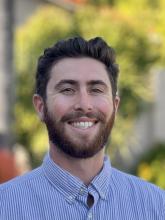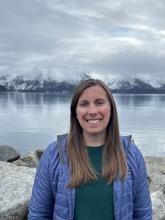The Department of Chemistry is pleased to announce the following prizes for outstanding work by graduate students. These awards, announced each spring, recognize doctoral research and carry a $1,000 prize. The awards were established in Academic Year 2021-22 and are funded by endowments made possible through the philanthropic support of faculty, friends, and alumni.
George H. Cady Prize for Best Thesis in Inorganic Chemistry
Ben Mitchell earned his Ph.D. in 2023 for his work with Assistant Professor Alexandra Velian on “Leveraging Molecular Nanoclusters for Atomistic Insights Into Reactive Interfaces.” He is now a Science, Technology, and Policy Fellow of the Building Technologies Office in the Department of Energy. As a fellow, Ben works on advancing a range of innovative technologies and solutions to decarbonize commercial building infrastructure. Ben is based in Washington, DC.
Gary and Sue Christian Prize for Best Thesis in Analytical Chemistry
Caitlin Cain will earn her Ph.D. in 2024 for her work with Professor Robert Synovec on “Advances in the Chemometric Analysis of Multiway Chromatographic Data to Improve Discovery and Identification.” In summer 2024, she will begin a postdoctoral research position with Professor Robert Kennedy at the University of Michigan, where she will probe our understanding of the brain metabolome with use of capillary liquid chromatography-mass spectrometry and chemometric data analysis methods.
B. Seymour Rabinovitch Prize for Best Thesis in Physical Chemistry
Kristina Herman will earn her Ph.D. in 2024 for her work with Affiliate Professor Sotiris Xantheas titled “Extension of the Many-Body Expansion (MBE) to Periodic Systems: Developing Tools to Analyze and Improve Models of Intermolecular Interactions.” Kristina has accepted a position as a postdoctoral scholar with Prof. Greg Voth's group at the University of Chicago where she will develop multiscale computational models of the HIV life cycle.
Congratulations, Ben, Caitlin, and Kristina!



